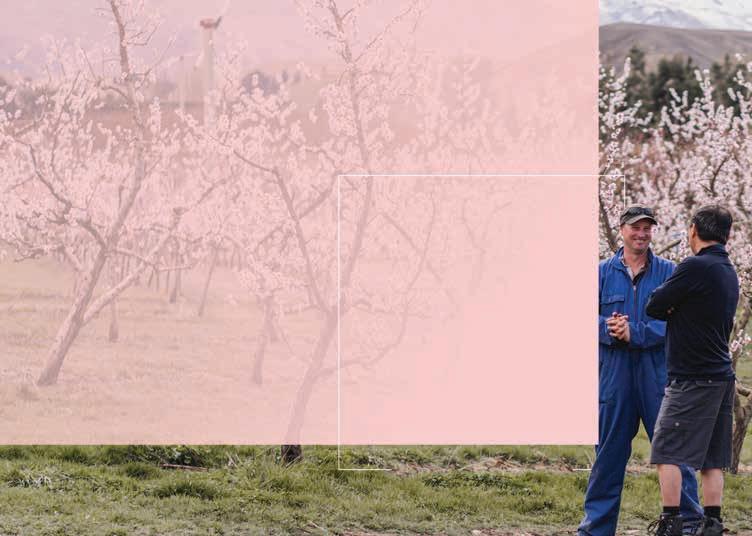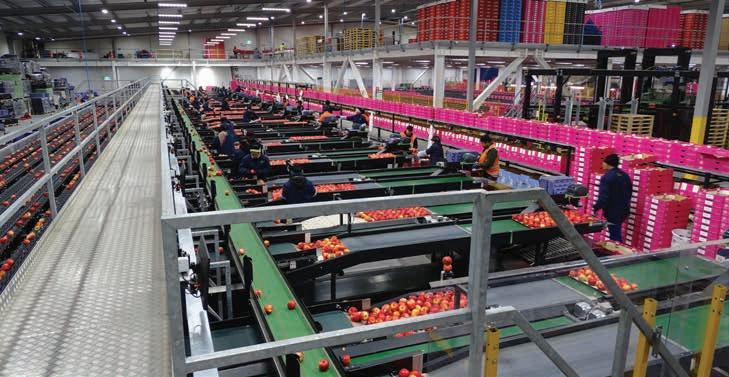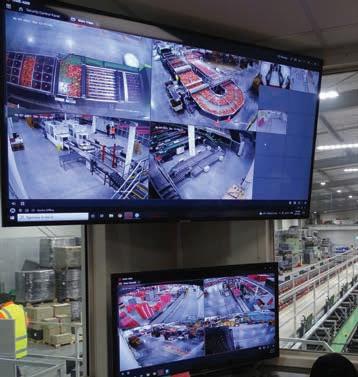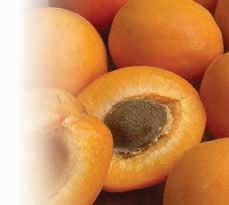
8 minute read
Golden Bay Fruit looks to the future
Heath Wilkins says there is a balance between technology, productivity and keeping people employed
Golden Bay Fruit could fully automate its state-of-the-art packhouse but continues to employ 60 staff because they are the “soul of the business”.
By Anne Hardie
Heath Wilkins, managing director of the Motueka company, says the packhouse staff are mostly women, including Recognised Seasonal Employer (RSE) Scheme workers from the Pacific Islands, who would miss out on the benefits of working in New Zealand if the horticulture industry became fully automated.
His comments follow the government’s push for horticulture to overcome labour shortages with technology. He points out the industry has already been working on technological improvements long before the labour shortages, but developments take time. “We have only just got to the point where we are actually thinking about the ability of the technology we need in order to harvest that fruit. People have been working on this for a number of years, and the new policies are just increasing the time pressure. But the technology isn’t there yet. Even if we worked day and night for the next five years, we would be very, very lucky to have a commercial prototype by then.”
Golden Bay Fruit is working with a United Kingdom company on technology, which includes robotic picking, thinning and drones for harvesting. This season they will be exploring some of that technology in the orchard. Heath thinks the drones might be the future once the tree
structure is robot ready. That’s still years away, he says. In the packhouse, the vertically integrated company, which involves three multi-generational families, uses Greefa technology, including robotics to sort and handle apples from their combined apple crop of more than 750 ha.
Before the packhouse was built in 2019 they ran two older packhouses, and four shifts with 60 people packing 280 bins per day. Today they still employ 60 people who pack the fruit into boxes at the end of the line. The difference is that those 60 people now have double the throughput per person on a ninehour shift.
Heath says they could take 40 people out of the packhouse and replace them with robotics, but they also want to keep people employed and take pride in doing that. “We thought we had a good community story to tell our customers overseas. We were a company that had a nice balance between technology and productivity, and a social conscience by keeping people employed. “But we hear from the government that what we are employing is what they deem to be a low-value workforce that is reducing our productivity, keeping our wages low, damaging the economy, and that everyone should be able to upskill and become a computer technician or a robot engineer.” He says it is unrealistic to expect everyone to upskill to the type of jobs that will come with technology, especially in a short period of time. Some won’t be able to, others won’t want to, and it is likely to take five to 10 years to bring the next generation through with those skills.

We know horticulture

Collaborating, innovating and supporting New Zealand growers
For regular product updates and technical news, visit fruitfedsupplies.co.nz and sign up to the Fruitfed Supplies e-newsletter.
fruitfedsupplies.co.nz

Robotics could replace many of the packhouse staff, but people are important
In the orchard, the physicality of the job demands fit, young people, and more often than not, men, to prune and harvest. The RSE workers have excelled at that. Women from those same communities in the Pacific Islands – Samoa and Vanuatu – have been employed in the packhouse by Golden Bay Fruit for more than a decade. “We want to give the women from the islands, and the community, the ability to work in a job they are well suited for, which pays an equal amount of money to what a man can earn out in the field. If we take those roles away and put robots there, those jobs are gone. We won’t have the diversity in our business, the women from the Pacific Island villages won’t be able to participate, and the balance of succeeding in their home countries will be significantly weighted toward the male worker. We don’t see that as progress. “We are being forced by the government to look at taking those people out and put more robots in our packhouse. Basically, discard those people. “One of the greatest enjoyments in my business life is walking through the orchards and packhouse and seeing people who are happy and eager to see you and say hi to you. Building that culture up over a long period of time has been a true success for our business, and it’s something we are reasonably proud of. It’s definitely a partnershiptype scenario.
“Without that? Well, you lose a bit of your soul, don’t you?” What Heath wants is leadership from the government – a pathway through unprecedented, difficult times. He wants the importance of RSE workers in horticulture to be recognised, as well as the importance of those jobs for the workers and their communities. And he wants the health response to Covid-19 to take that into account.
“The health response to date is unsustainable,” he says. “The government needs to know the critical pinch points for all industries in the next 12 months or so and put things in place to help those industries. Otherwise, people will disappear from those industries.”

The view from the control room
Family businesses in the horticulture industry are under severe pressure as they are more susceptible than the corporate structure to RSE shortages, he says. They are one of the unintended consequences of the government’s policies. He struggles to fathom how the government can have a travel bubble with Australia at a time it has Covid-19 in the country, yet no pathway to Covid-free Pacific Islands for RSE workers to come and go. “No-one wants to export Covid-19 to the Pacific Islands. So, you put things in place that minimise that risk when those people need to go home in seven to 12 months. A) they are all vaccinated and B) they are quarantined here on-farm before they head home, or else there is a quarantine facility we work with in Samoa or other Pacific Islands, and we help fund that scenario.”
Instead, orchardists are being forced to fund MIQ (Managed Isolation and Quarantine) in New Zealand to bring people in from non-Covid-19 countries at a sum of $5,628 per person excluding GST, according to the latest costings. Golden Bay Fruit has brought 35 people in through MIQ and has requested 150 more between now and next February. Many of the RSE workers working for the company have been in New Zealand for 15 months and are looking forward to going home in September. While they need to get home and see their families, Heath says those RSE workers also worry they won’t be able to get back to New Zealand because of the restrictions.
Golden Bay Fruit usually employs 400 RSE workers at the peak of the season, but this past season had about 200 due to the restrictions. He says the only reason they managed to get through the season with such a shortage of labour was because of the massive Boxing Day hailstorm that destroyed half the crop. Because of the losses incurred this year, the company will have 80% of its next crop under hail cloth, up from 50% this year. “I’m not going through another year like this one. It ruins your business. If you are a fully integrated business from growing through to packhouse, logistics and marketing, you don’t just get hurt at the grower level. You get hurt right the way through the chain. We haven’t been able to supply all of our customers with the volume of fruit needed, so they rightfully had to deal with our competitors this season. It will be a huge challenge to get them back next season when our volumes are back up again.” That fruit is the result of investment in new varieties and he says that is how New Zealand competes on the world stage because it can’t compete in costs, due in good part to the lower wages in countries such as Chile and South Africa.

L.E. Cooke Nurseryman
Ltd
Growers of high quality fruit trees
• Apples • Apricots • Cherries • Nectarines • Peaches • Pears • Plums
Est 1956
L.E. Cooke Nurseryman
Ltd Try us first for your fruit tree requirements!
Marty & Kelli Cooke
PH: 06 870 7043 EMAIL: lecooke@xtra.co.nz CELL: 0274 396 205 (Marty)










